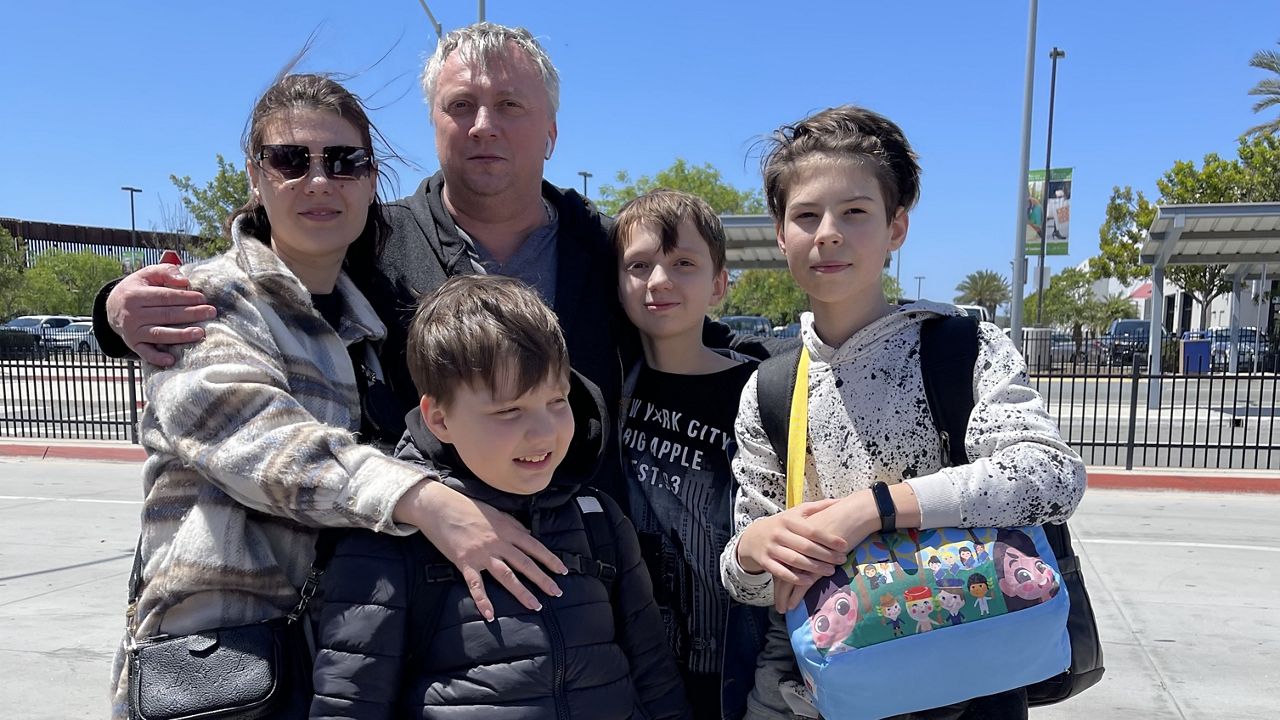Iryna Kramareva knows that her family will likely never be able to go home.
They left last March from Mariupol – the city heavily bombarded by Russian forces last February and finally overtaken in May, where thousands of civilians were killed.
Crossing the southwest border into the U.S. with her husband and three sons last April was like a sigh of relief, Kramareva told Spectrum News from Jacksonville, Florida, on Thursday.
“Her stress was over,” said her translator, Jane Logvinova, who works through Lutheran Social Services of Northeast Florida (LSS) to help get Ukrainians in northeast Florida resettled.
Kramareva’s family went from city to city in Ukraine, and then Europe, until they reached Tijuana, Mexico, where they crossed the border into the United States and were granted 364 days of humanitarian parole, allowing them to temporarily live and work legally.
“They want to be just [a] safe home for their kids,” Logvinova translated.
Like the Kramarev family, the majority of Ukrainians who entered the United States since Russia’s invasion began one year ago have temporary status. The Biden administration has welcomed nearly 300,000 Ukrainians in total, including about 115,000 into a two-year program launched last April called Uniting for Ukraine, which requires U.S.-based sponsors.
But for many of the approximately 20,000 Ukrainians who crossed over the U.S.-Mexico border in the early days of the conflict, their one-year legal status is on the cusp of expiring in weeks, depending on the date they arrived.
Parole is an emergency authority the Biden administration has leaned on to welcome thousands of people fleeing crises in the last two years, including Afghans and Ukrainians.
“But if you have any desire to stay here permanently, or even longer than the parole period, you are not left with a lot of options,” said Naomi Steinberg, vice president for policy and advocacy at HIAS. “Ukraine is not a safe place to return to.”
Kramareva’s family is applying for asylum with the help of lawyers coordinated by LSS, but they face a system with hundreds of thousands of cases in the backlog. If that doesn’t work, they plan to try for Temporary Protected Status, or TPS, which grants 18 months of protection.
But immigration advocates are calling on the administration to act in a way that would shield all Ukrainians with temporary status from falling into legal limbo, like offering "re-parole."
“It's important for us to look at extending parole [and] work authorizations for Ukrainians, so avoid sending them back into harm's way,” said Faith Cooper, regional director for the southern border at the International Rescue Committee. “They can be able to continue to sustain their livelihood.”
In a statement to Spectrum News, a spokesperson for the Department of Homeland Security said they are “committed to supporting Ukrainians in the United States” and “continue to explore opportunities to provide avenues for humanitarian relief and protection.”
The need for additional pathways is urgent, Steinberg said, ideally “yesterday.”
“We want this as soon as possible,” she said. “The pressure is really mounting … for the individuals who entered through the southern border.”
Congress could also act to secure Ukrainian parolees’ status, but a similar effort for Afghans has stalled out on Capitol Hill over the last year.
Approximately 147,000 Ukrainians have been authorized for two-year parole under the Uniting for Ukraine program, and 115,000 have arrived, according to DHS data. Another 156,000 have come to the United States outside of that program, like the Kramarev family.
Another 18,500 have received TPS, which is available through October and provides 18 months of projections.
Typically, parolees do not get refugee benefits, but they were approved for some supplemental government help through the U.S. Office of Refugee Resettlement. If they lose their legal status in the United States, they would also lose that federal aid.
Iryna and her family, for example, have one year of Medicaid benefits and they received help with rent, too. Organizations like LSS, HIAS, the IRC and others around the country help register kids in schools, host events for Ukrainians and help them find work.
Thousands have settled around the United States, the most in areas including the New York and Los Angeles metro areas, Cleveland, Ohio and Washington, D.C., region.
Worldwide, the United Nations Refugee Agency estimates that more than eight million people have left Ukraine, most of them settling in neighboring Poland or the Czech Republic.
A fall UNHCR survey concluded that more than 80% will want to return to Ukraine. Biden administration officials think most Ukrainians in the U.S. feel the same.
But some, like Kramareva, don’t see it as an option. Their city is destroyed and in Russian control. Plus, she said Jacksonville has been a better fit for her family, especially her son, who suffered a head injury when he was young. He’s gotten the medical care he needs, and the warm weather helps, too.
“The situation [in Ukraine] is not good right now. And we don’t know how it will be in the future,” she said through her translator. “But she cannot do anything. Because she has to be talking about her family, about her three sons.”



